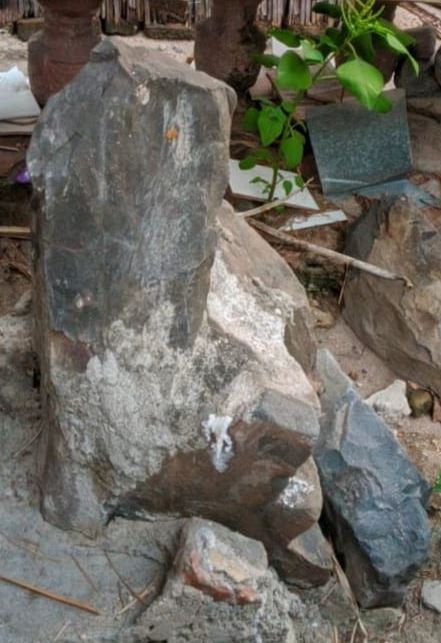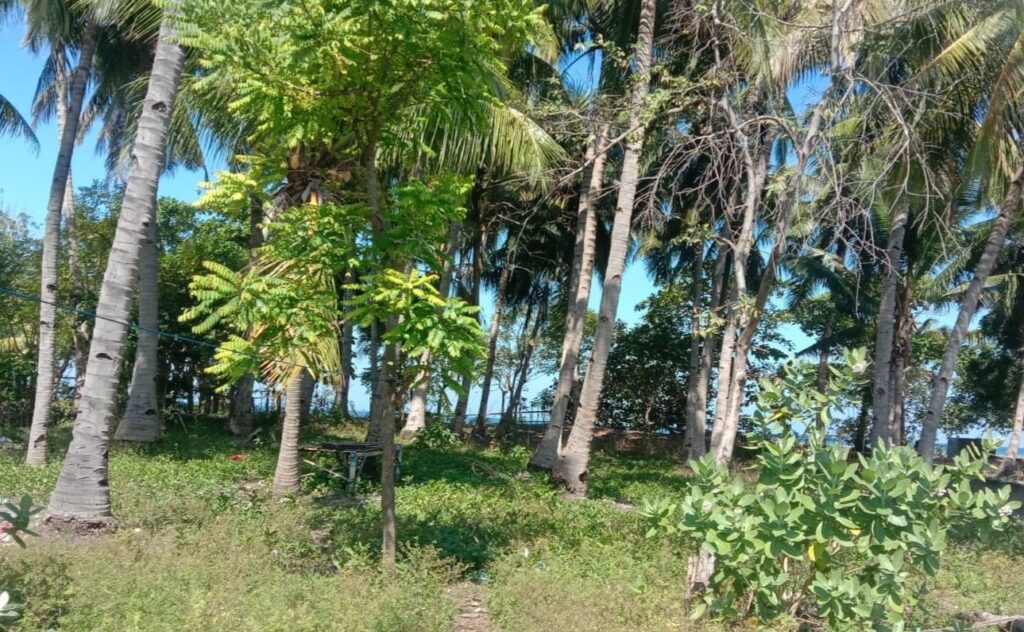This post is also available in:
![]() Indonesia
Indonesia
Written by : Francisco Soarez Pati, S.H
Email: fransisco78@gmail.com
Photos by Fransisco Soarez Pati, S.H
The Portuguese was the first Europeans country to conquer a number of areas in the Nusantara. The territory that was conquered by the Portuguese was then captured by the Dutch by war, negotiation, deceit, fighting and buying and selling under the guise of exchanging colonial territories. The territories that were contested by the Portuguese and the Dutch later became part of the largest archipelagic country in the world, called the Unitary State of the Republic of Indonesia.
The presence of the Portuguese in the XV to XVII centuries in a number of Nusantara areas, including Aceh, Java, Ternate, Tidore, Makasar, Manado, Solor, Adonara, Alor and it’s surroundings, the islands of Timor and Flores in general, especially in Sikka district, East Nusa Tenggara province, Indonesia does not apart from the mission of the Portuguese colonial nation at that time, namely Feitaria, fortaleza, a Igreja which means trade, military domination and evangelization. In the English version of Feitaria, Fortaleza, a Igreja later interpreted as Gold, Glory, Gospel.
In Sikka district in the island of Flores Island, East Nusa Tenggara Province beside from the villages of Sikka and Paga which are widely known as former Portuguese colonial territories which regulated in an agreement called Tratado Demarcação E Troca De Algumas Possessoes Portuguese E Neerlandezas No Archipelago De Solor E Timor which means Agreement on Demarcation and Exchange of Some Portuguese and Dutch Ownerships in the Solor and Timor Islands which was signed by Dom Pedro V and Mauricio Helderwier on 20 April 1859, it turns out that there are still a number of other places which at least had Portuguese influence, such as Bola sub-district and Kewapate sub-district and a source of fresh water on the northern coast of the island of Flores named Wair Noke Rua which means spring of saint. Located 12 km from the city of Maumere to the north of the island of Flores, the place is believed to be the place where Saint Francis Xavier stopped on his voyage from Ternate to Malacca at that time to fill up supplies.
Although currently there is no colonization around the world, the traces and Portuguese influences in Sikka Regency can be found to this day, namely an Old Church in Sikka village, a number of heirlooms were brought by King Dom Alexius Ximenes da Silva from Malacca such as a helmet, two necklaces, a scepter all of which were made of gold. The heirloom was given by the Portuguese when he crowned Dom Alexius Ximenes da Silva as king. As a form of gratitude, the Portuguese were then given a number of these items along with partial hegemony rights in and around Sikka. Beside that there is a vacant lot which local people in Paga believed as a place that the Church was founded by the Portuguese which the local people call the Manu Church, a grave stone. the place believed to be the burial place of 2 Portuguese people, the Bobu dance and Portuguese cannon in Paga sub-district.
In Sikka district there is also a rock on the southern coast of the Sawu Sea in Bola sub-district. In the sixteenth century the Portuguese planted a cross on the rock which the local people called Watu Cruz (Stone of the Cross), and also the name of the sub-district of Queva–Pantai (Kewapante) and Portuguese clans such as Da Gama, Da Silva, Da Gomez, Da Cunha, Da Lopez, Da Costa, Da Rato, Parera, Fernandez, Carwayu (Carvalho), Rodriquez Kondi (Conde) as well as a number of nicknames such as Samador (Semeador), Don, Ximenes, Menina, Soares, Alvares, Tavares, Pedro, Jasinta, Jose, Maria, Edmundus (Edmundo), et cetera.

One of the Portuguese heritage that has integrated into the culture of the people of Sikka Regency up to now is the use of a number of vocabularies in daily communication in the Sikka regional language (Krowe) which have been spoken from generation to generation since the fifteenth century.
A number of Portuguese vocabularies that have been integrated into the culture of the Sikka Regency communities, including Misa means the celebration of the Eucharist in the Catholic liturgy, Gereja from the word of Igreja which means Church, Cruz from the word of Cruz meaning Cross, Sumana from the word of Semana meaning Week, Semana Santa from the word of Semana Santa meaning Holy Week, Segunda from the word of Segunda meaning Monday, Terça-feira from the word of Terça feira meaning Tuesday, Quarta from the word of Quarta meaning Wednesday, Quinta from the word of Quinta meaning Thursday, Sesta from the word of Sexta Feira meaning Friday, Sabut from the word of Sábado meaning Saturday, Duminggu from the word of Domingo meaning Sunday, Seu from the word of Ceu meaning Heaven, Anjo from the word of Anjo which means Angel, Anjo Da Guarda from the word of Anjo Da Guarda which means Guardian Angel, Plender from the word of Aprender which means learning, Jentiu from the word of Gentios (non-Jewish). In the Sikka language “jentiu” is identified with a lazy people going to Church, and then Santa from the word of Santa means saint (for female), Santo from the word of Santo means saint (for male), Bola from the word of Bola means ball, Siruwisu from the word of Serviço means serving in the sense of livelihood or work, Kadera from the word of Cadeira meaning chair, lemari from the word of Almario meaning cupboard, Armada from the word of Armada meaning fleet, bendera from the word of Bandeira meaning flag, Violin from the word of violin meaning violin, boneka from the word of Boneca meaning doll, Dadu from the word of Dados meaning dice, Dansa from the word of Dança meaning dance, Kama from the word of Cama meaning bed, Ganco from the word of Gancho meaning ganco, Jendela from the word of Janela meaning window, kemeja from the word of Camisa meaning shirt, kertas from the word of Carta meaning letter, lentera from the word of lenterna meaning lantern, meja from the word of Mesa meaning table, mentega from the word of Manteiga means butter, Nona from the word of dona means miss, permisi from the word of Permissão which means permission, pesta from the word of festa means party, sabang from the word Sabão means soap, serdadu from the word Soldado means soldier, terigu from the word of Trigo means wheat, tinta from the word of Tinta means ink, Lesu from the word of Lenço means handkerchief, Bako from the word of tabaco means cigarette, Tapioca from the word of Tapioca means a starch extracted from cassava root, sepatu from the word of Sapato means Shoes, Salto from the word of salto means somersault, Rosario from the word Rosario of means rosary, pesir from the word of Passear which means traveling, Peniti from the word of Alfinete which means pin, markisa from the word Maracujá means Passion fruit, mandor from the word of Mandador meaning foreman, Martir from the word of Mártir meaning Martyr, Kapitan from the word of capitão meaning lieutenant, Gudang from the word of gudão meaning warehouse, Botir from the word of botelha meaning bottle, Aula from the word of Aula meaning hall, Akta from the word of Acta means certificate, Politik from the word of Politico means politics, Maitua from the word of Mãe means mother (dedicated to young women), Paitua from the word of Pai means father (dedicated to youth), Tripleks from the word of Triplex means triplex, Ara from the word of Arroz means rice, garpu from the word of Garfo means fork, Pasku from the word Pascoa meaning Easter, Natal from the word Natal meaning Christmas, cantar from the word Canta meaning sing, and the last is Mate from the word of Morto means death.

In addition, one of the Portuguese colonial heritages that is deeply rooted in the life of the people of Sikka district and the people of the island of Flores island, Indonesia is Catholicism. The journey of Catholicism on the islands of Flores, Solor, Adonara, Lembata and it’s surroundings has a long history. At the time of negotiations to follow up the agreement on the sale of Portuguese colonial territories throughout the islands of Flores, West Timor, Solor, Adoara, Alor and Pantar which became known as Tratado Demarcação E Troca De Algumas Possessoes Portuguese E Neerlandezas No Archipelago De Solor E Timor, which means Agreement Demarcation and Exchange of Some Portuguese and Dutch Ownerships in the Solor and Timor Islands that has signed by Dom Pedro V and Mauricio Helderwier on 20 April 1859, the Dutch Parliament objected because in the agreement the Portuguese did not give freedom to the Dutch to carry Protestant missions (Zendeling) on the island of Flores and it’s surroundings. On the other hand, the Portuguese remained in their stance that the Catholic religion which had been introduced to the people in Flores island and it’s surroundings should remain the religion of the people.
Instead, the Dutch were given the freedom to carry out Protestant missions in the western part of the island of Timor and the surrounding islands. The spread of Protestantism can be seen from the identity of the people in the province of East Nusa Tenggara in the western part of the island of Timor, namely parts of the districts of North Central Timor, South Central Timor, Kupang, Sabu, Rote, Sumba and the Alor archipelago, where the majority of modern society is currently Protestant. Meanwhile, the people of Flores, Solor, Adonara, Lembata and the surrounding islands are Catholic.
Karel Steenbrink in his book entitled Catholics in Indonesia, Volume I, the publisher of Ledalero, Maumere, stated that the principle of the Portuguese colonial nation at that time was “the flag may be changed, but religion should not be changed. Roman Catholicism must be preserved as before” (O catolicismo Romano deve ser preservado como antes). Catholicism then took root in the community of Sikka district in particular and the people of the island of Flores and it’s surroundings in general and remains the religion of the majority of the community. Without the Portuguese, the people of the islands of Flores, Solor, Adonara, and Lembata in Indonesia probably would not have known Catholicism today (Sem os Portugueses, o povo das ilhas das Flores, Solor, Adonara e Lembata talvez não saber do catolicismo hoje).
BIBLIOGRAPHY :
- (1861), Tratado Demarcação E Troca De Algumas Possessoes Portuguese E Neerlandezas No Archipelago De Solor E Timor, Entre Sua Magistrade El-Rei De Portugal E Sua Magistade El Rei De Paizes Baixos, Assignado Em Lisboa Pelos 20 Abril, 1859
- António d’Oliveira Pinto da França, Pengaruh Portugis Di Indonesia, Cetakan Pertama, PT. Penebar Swadaya, , 2000, translated by Katoppo from the original title “Portuguese Influenced in Indonesia”, Calouste Gulbenkian Foundation, Lisabon, 1985
- Joaquim Magalhães de Castro, Lautan Rempah Peninggalan Portugis di Nusantara, PT. Elexmedia Computindo, 2019
- Karel Steenbrink, Orang-Orang Katolik Di Indonesia, 1808-1942, Sebuah Profil Sejarah, Jilid I, Penerbit Ledalero, Cetakan I, April, 2006.
This post is also available in:
![]() Indonesia
Indonesia